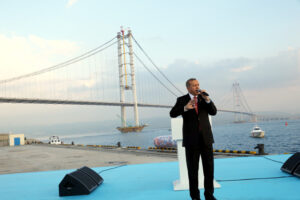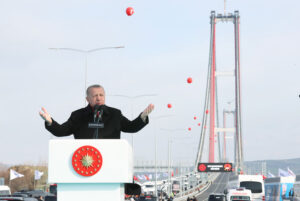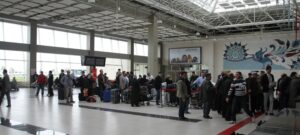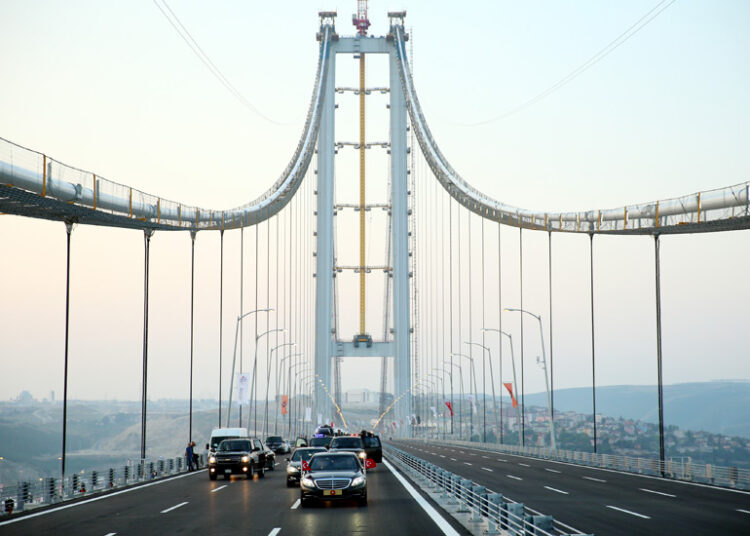Abdullah Bozkurt/Stockholm
Turkish President Recep Tayyip Erdogan often showcases large infrastructure projects during ribbon-cutting ceremonies to appeal to voters and boast about Turkey’s progress, claiming they cost the state nothing, while in reality, it is Turkish taxpayers who foot the bill for inflated contracts that primarily benefit Erdogan’s inner circle and a network of crony businesspeople.
These mega projects, carried out under build-operate-transfer (BOT) schemes, are almost exclusively awarded to companies closely aligned with Erdogan or secretly owned by his family, often without competitive bidding, and despite large sums being funneled from the Treasury to these firms each year under the terms of these agreements, the contract details remain hidden under the pretense of trade confidentiality, even though public funds are used to finance private entities.
Erdogan publicly claims that no state funds are used for BOT projects and that all funding comes from businesspeople, but this is misleading, as these contracts include state-backed revenue guarantees, meaning if the project fails to meet income targets by year-end, the government covers the shortfall, ensuring the companies never operate at a loss.
Several prominent examples illustrate how this system works, such as in 2024 when the Treasury paid €314.18 million to the private operator of the Çanakkale Bridge, which spans the Dardanelles Strait and connects Europe and Asia. Completed in March 2022, the bridge was subject to a state-backed guarantee for annual vehicle traffic.
When the contract was awarded to a consortium of five companies — including Limak, Yapı Merkez and the SK Group, all with close ties to Erdogan — the government guaranteed 16,425,000 annual vehicle crossings, but in reality, only 1,464,000 vehicles crossed the bridge between March 2024 and March 2025, resulting in a staggering 91 percent shortfall.

This discrepancy was no accident; Erdogan deliberately inflated traffic projections to generate massive profits for loyal crony businesspeople, who in turn funnel portions of their earnings back to him and his family, financing the ruling Justice and Development Party’s (AKP) election campaigns and supporting pro-government media outlets.
Given that the bridge cost around €2.5 billion to build, the consortium is expected to recover its investment within a few years, all while benefiting from a 16-year, two-month operational contract. Moreover, both tolls (€15 plus VAT for passenger cars) and state guarantees are indexed to the euro, not the Turkish lira, shielding the companies from inflation and a loss in value of the Turkish currency.
While Erdogan publicly urges Turks to use only the lira in their transactions, bank deposits and savings, this message is conveniently disregarded when it comes to enriching his cronies, who were awarded contracts in foreign currency. It is sheer hypocrisy — something Erdogan seems unconcerned about, given his near-total control over Turkish media and the public narrative.
Another glaring example is the Zafer Airport, serving the western cities of Kütahya, Afyonkarahisar and Uşak. Constructed by pro-government firm IC İÇTAŞ and opened in 2012 at a cost of €50 million, the airport has consistently underperformed. Nevertheless, due to an aggressive passenger guarantee clause, the Treasury has already paid €73.17 million to the operator — far exceeding the original construction cost.
For 2024 alone, the government guaranteed 1,317,733 passengers for the airport, while actual traffic was only 32,958 — a 97.49 percent shortfall. As a result, the Treasury had to pay €6.8 million in compensation for that year. Under the current agreement, IC İÇTAŞ will continue receiving annual compensation until the airport reverts to state ownership in 2044. If the current trend continues, the total payout could reach €208 million, more than four times the initial investment.

Similarly, the Osmangazi Bridge, which links Istanbul to the Aegean highway, costs taxpayers hundreds of millions of dollars annually. Built by a consortium including Nurol, Özaltın, Makyol, Astaldi and Yüksel, the bridge has been operational since 2016.
Although actual vehicle crossings exceeded the government’s guaranteed figure — 19.5 million versus 14.6 million — the Treasury still paid $570 million to the operator in 2024. This is because the guarantee also covers toll revenue. The agreed-upon toll per vehicle is $35 plus VAT, and it rises each year based on US inflation. By 2025 the guaranteed toll has increased to $55, or TL 1,938. Since drivers only pay 555 lira, the Treasury covers the remaining TL 1,383 per vehicle, making this bridge a cash cow for the operating consortium and a growing liability for Turkish taxpayers.
The consortium has a 22-year operating license and reportedly spent $1.3 billion on the bridge. It has already earned well beyond that amount.
These are certainly not isolated incidents but rather part of a broader pattern. Over the past decade, Turkey’s mega-infrastructure projects — from bridges, roads and tunnels to airports and city hospitals — have been monopolized by a small group of politically connected firms.

These companies win contracts either through direct awards or limited tenders and gain access to cheap, state-backed financing from lenders like Halkbank and Ziraat Bankası. In other words, they don’t even invest their own money in the construction of these projects, contrary to Erdogan’s claims; if they do, it is only a small portion of the initial capital investment.
Furthermore, the government often constructs and finances the connecting infrastructure for these projects, providing indirect subsidies as well. Legal oversight is almost nonexistent since Erdogan’s administration maintains tight control over the judiciary.
Lawmakers and journalists seeking to uncover details about these contracts are routinely denied access to the information and documents, with trade secrecy and confidentiality clauses cited to obstruct public scrutiny, despite the involvement of public funds.
This is a textbook example of crony capitalism with a Turkish twist. Erdogan has engineered a massive patronage network, enriching his allies in the corporate world, accumulating personal and family wealth through kickbacks, and redistributing national wealth from ordinary taxpayers — who are forced to pay taxes every time they purchase goods, including basic necessities — to a privileged few.












